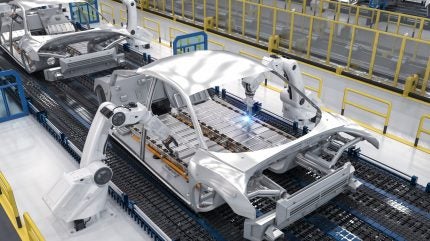
Ford Otosan, a joint venture between Ford Motor and Koç Holding in Turkey, has deployed D-Wave Quantum’s vehicle manufacturing application to streamline its manufacturing processes for the Ford Transit line of vehicles.
Developed using D-Wave Quantum’s annealing quantum computing technology, the application has improved production sequencing for Ford Otosan, D-Wave said.

Discover B2B Marketing That Performs
Combine business intelligence and editorial excellence to reach engaged professionals across 36 leading media platforms.
Ford Otosan manufactures Ford Transit line of vehicles, including passenger vans.
Ford Transit, known for its extensive customisation options with over 1,500 variants, is clamed to pose a manufacturing challenge due to the efficiency losses when switching production setups for different specifications.
In collaboration with D-Wave, Ford Otosan intends to address this issue by optimising production sequencing, which involves maximising throughput while adhering to the constraints of the body shop, paint shop, and assembly line.
Through D-Wave’s Leap quantum cloud service and hybrid solvers, Ford Otosan has reduced the scheduling time from 30 minutes to under five for 1,000 vehicles.
This quantum computing solution not only speeds up the process but also provides the flexibility to adjust to demand fluctuations and part availability, maintaining high productivity levels, D-Wave noted.
Ford Otosan data scientist Ziya Dalkılıç said: “It is imperative that Ford Otosan maintains the highest standards of production processes and efficiencies to meet customer demand.
“Working with D-Wave’s technology, we’ve built and now deployed a quantum optimisation application that goes beyond what we were able to achieve with a purely classical computing approach.”
By implementing this technology, Ford Otosan also aims to reduce unplanned maintenance and create a more stable production environment.
D-Wave CEO Dr Alan Baratz said: “Production scheduling demands meticulous planning and agile responses, and classical computing methods can often struggle to keep up with the manufacturing industry’s growing scale and complexity.
“For manufacturers on the leading-edge of innovation—such as Ford Otosan—D-Wave’s quantum computing technology has proven capable of finding better solutions to complex, real-world problems than classical computing alone. We’re thrilled to see this application move into production and help Ford Otosan realise the powerful benefits of quantum.”
Looking ahead, Ford Otosan plans to expand the use of quantum scheduling to other body shops and hopes to extend the optimisation benefits to paint shops, assembly lines, and buffer zones.






